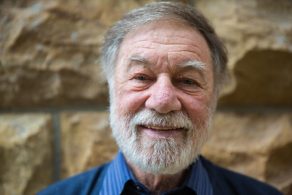David Sanders: a tribute to a public health pioneer
On by Sarah Cowen-Rivers
A tribute to David Sanders by Ruth Stern- a Health Poverty Action trustee and a former senior researcher and lecturer in public health at the University of Western Cape in South Africa.

When David Sanders, a committed health activist, academic and a founding member of the People’s Health Movement (PHM), died suddenly from a heart attack on 30th August 2019, health activists, scholars and practitioners from all over the world were in shock. After all David was immortal. He was going to be with us forever.
As the hundreds of tributes poured in, we saw the extent of his influence – not that any of us who knew him doubted the magnitude of his contribution. Among the terms used to describe David were inspirational, courageous, principled, a brilliant teacher with a deep intellect and an ability to communicate clearly and effectively. He also never gave up on his principles and his commitment to social justice, and was true to his values – whether teaching students, mobilising communities, or challenging governments and institutions, regardless of how much friction that caused.
David grew up in what was then called Rhodesia (now Zimbabwe), where he studied Medicine, and became a paediatrician. The injustices he saw as a student were life changing for him. As a 4th year student at the time, he established a community clinic at a local hospital in response. This was followed by a period in the UK to avoid the Rhodesian army, where, true to his principles, he became involved in both UK health politics and Southern African liberation struggles. As soon as he could David returned south, first to the newly independent Zimbabwe where he designed and coordinated a large rural health programme, and later to South Africa to set up what is now a thriving School of Public Health (SOPH) at the University of Western Cape. During that time he wrote two seminal books, the Struggle for Health and Questioning the Solutions (with David Werner). These have been described as highly analytical yet accessible books that have inspired many to revisit their understanding of health and illness, and the inter-relationship between politics, economics and health.
In addition to his clinical and academic career, David was one of the instigators of the People’s Health Movement, which has informed the values and principles of Health Poverty Action. In that respect he was part of a large global network of activists, striving for a better life for those denied their human right to health. We were delighted when he became a Special Advisor to Health Poverty Action, making himself available to us whenever he visited the UK, or through email or skype when we needed advice. We were particularly honoured to have him teach on an advocacy course for Health Poverty Action’s African country directors in Nairobi in 2018.
There are many people from all over Africa and globally who will say that meeting David changed their lives. I am undoubtedly one of them. Even my position as a Trustee on the Board of HPA can be attributed to the knowledge and experiences I gained by knowing him.
I was extremely fortunate to meet David in London in the 1970’s through his involvement in a campaign against private practice in the NHS. That resulted in a friendship that spanned 4 decades, and when the opportunity presented itself, a chance to return to South Africa, my home country, to work in David’s team at the School of Public Health (SOPH). As a health practitioner in the UK, I thought I had a reasonable understanding of the politics of health. How much more I learnt during those years in Cape Town! In establishing the SOPH, David created an environment where it was assumed that health was a broad social, political and economic concern; that rigorous evidence-based research provided a foundation from which to challenge; and that part of being an academic was to work closely with communities. Above all, it was an environment in which we questioned what he called ‘the causes of the causes of ill health’ by always asking the question ‘but why’ about any health concern.
David was kind, patient and fun to be with – he had an amazing sense of humour. He always had time for students and for communities that were involved in the struggle for health. Inevitably, like any pioneer, he could also be exasperating- failing to comply with organisational proceedings and niceties. He could also be extremely impatient, finding it hard to understand why his point of view was not being listened to and why those in establishment positions did not do more to change ‘the causes of the causes’. But above all, he was loved. His genuine interest in people and his integrity shone through and made him revered even among those he challenged.
Of course, even the most influential leaders have people that provide the support to make their contributions possible. A tribute to David would not be complete without mention of those who supported his vision. Above all, his wife, Sue Fawcus, a successful clinician and academic in her own right. But also his colleagues at the SOPH; colleagues in health systems throughout the world; his comrades in PHM; and various friends locally and globally. A huge gap has been left, especially for his family – Sue, his three children, Ben, Lisa and Oscar, and his sister Marsha, but also for the rest of us. He is remembered with deep affection and gratitude. Thank you David for enriching so many lives. We will do our best honour your memory by continuing with the work you strived so hard to achieve.

